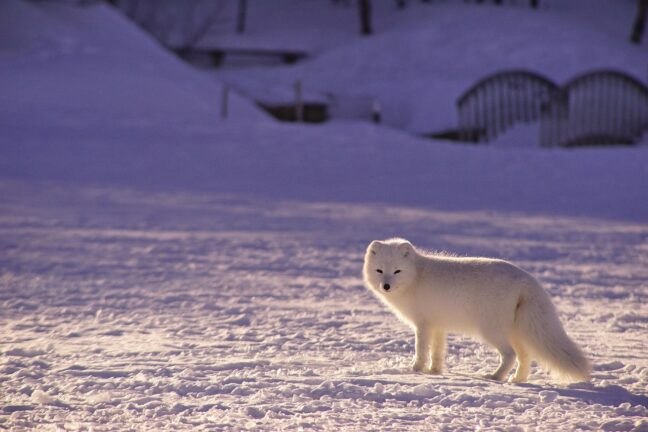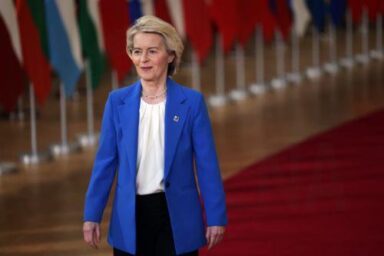To stave off expansionist policies of Moscow and Beijing in the Arctic, EU must enter the intensifying geopolitical competition in the region decisively, European lawmakers have told the Commission (and the world at large).
The European Parliament’s Foreign Affairs Committe (AFET) adopted on Tuesday, 4 November a report focusing on strengthening the European Union’s diplomatic strategy and geopolitical cooperation in the Arctic region. A central theme is the need to enhance the EU’s deterrence capabilities and defend critical infrastructure like submarine cables and pipelines.
Risks and opportunities
The report also recognises the Arctic’s growing strategic importance due to climate change, which is rapidly transforming the environment by shrinking the ice cap and opening new commercial routes. It highlights the region’s increased activity and presence of global powers such as Russia and China, which has heightened geopolitical tensions and necessitated a stronger EU response.
Under the stewardship of rapporteur Urmas Paet (Renew/EST) , the report, formally known as 2025/2116(INI), breezed through the AFET committee, with 45 votes in favour, seven against, and five abstentions. “I subjectively say that yes, Europe has to do much more vis-à-vis Arctic,“ the rapporteur said. „We have there still lots of opportunities. The situation of course is very quickly developing in the Arctic, and that’s why it is absolutely important that EU is not just following developments over there, but in positive sense is also much more active and participates,“ Mr Paet remarked.
The Arctic is warming four times faster than the global average, causing the retreat of sea ice and opening potentially year-round commercial corridors like the Northern Sea Route. This new accessibility raises economic opportunities but also significant security and environmental challenges. ”This recommendation by the European Parliament underscores the urgent need for a robust, security-oriented EU strategy that ensures the Arctic remains governed by the principles of international law, sustainable principles, and peace,” the report reads.
You might be interested
Areas of internal debate
Russia has expanded its military presence, while China seeks to increase its footprint through its so-called Polar Silk Road. The report emphasises the need for “scrupulous respect for international law,” especially the United Nations Convention on the Law of the Sea (UNCLOS), to maintain peace and stability.
Greenland features prominently as a strategic partner given its chairmanship of the Arctic Council (2025–2027) and its growing geopolitical importance. The report supports “an enhanced political dialogue on bilateral cooperation with Greenland” and stresses sustainable resource extraction aligned with environmental standards.
The situation of course is very quickly developing in the Arctic, and that’s why it is absolutely important that EU is not just following developments over there, but in positive sense is also much more active and participates. — MEP Urmas Paet (Renew/EST), AFET rapporteur for the Arctic report
Several member states have revised their Arctic strategies in light of heightened tensions since Russia’s invasion of Ukraine, with countries like Germany, France, Norway and others advocating stronger defence postures and enhanced cooperation with NATO partners.
Policy gaps
Meanwhile, the European Parliament has regularly pushed for a tougher environmental stance, such as banning hydrocarbon extraction in “icy waters” under EU and EEA jurisdiction, curbing heavy fuel oil use in Arctic shipping, and establishing marine protected areas. However, the exact scope of these calls and their compatibility with economic interests remain disputed.
Further controversy surrounds the balance between geopolitical assertiveness and the principle of the Arctic as a zone of “peace and constructive cooperation.” Some voices warn that an overly confrontational approach risks escalating tensions with Russia and China, while others emphasise that recent Russian military build-up and Chinese ambitions demand a stronger EU presence.
Critics also highlight gaps in effectiveness, especially concerning the EU’s own contribution to Arctic pollution. Research shows black carbon emissions associated with shipping connected to EU trade have nearly doubled in the past decade, accelerating ice melt and environmental degradation.
The Nordic link
Meanwhile, key targets such as the banning of heavy fuel oil have yet to be implemented uniformly, sparking further debate on enforcement and adequacy of EU-level measures. The Arctic’s fragile ecosystems and the rights and welfare of Indigenous peoples add layers of complexity to policy formulation, requiring sensitive, inclusive governance.
The EU seeks to consolidate a Euro-Nordic dimension of cooperation, strengthening alliances with Nordic countries and Arctic stakeholders in a shifting landscape. This entails closer coordination with NATO and other alliances to enhance deterrence, safeguard critical underwater infrastructure (like submarine cables and pipelines), and uphold freedom of navigation.
This recommendation by the European Parliament underscores the urgent need for a robust, security-oriented EU strategy that ensures the Arctic remains governed by the principles of international law. — European Parliament’s draft report
In sum, 2025/2116(INI) reflects the EU’s urgent effort to find a coherent, balanced Arctic strategy against a backdrop of evolving security, environmental and geopolitical pressures—but its proposals are subject to robust debate within the Union over aims, methods and potential consequences. Member states, however, differ on the degree of ambition, the focus on military versus environmental priorities, and the mechanisms for coordinating with both Arctic states and global partners.
Indirect impact only
Following AFET’s approval, the report, the legislative process enters its next phases. After Tuesday’s committee endorsement, the file goes to the a plenary debate and vote. This allows MEPs to raise all sorts of issues, propose a host of further amendments, and generally have a good time throwing a wrench or two in the process. If the plenary approves the text, it becomes the official position of the Parliament on the issue.
Not that it means a whole lot. Being a non-legislative report, the inititative does not itself constitute any legislation whatsoever. It may, however, shape EU policy direction, diplomatic posture and funding priorities. It can, among other things influence European Commission initiatives, guiding legislative proposals or funding programmes.
In theory, the report may also inspire Council decisions and international diplomacy, underpinning coordinated EU approaches with Arctic states, NATO partners and multilateral forums. In the most optimistic of scenarios, it can even inform some national policies of member states, as governments adjust their own Arctic and defence strategies in alignment with EU positions.











